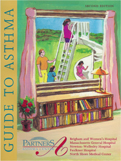Guide to Asthma
Lesson #4: Making your home safe for asthma
Most of us do not like the idea of having to take medicines every day. We would welcome another approach to controlling our asthma, one that helps us to minimize or perhaps even eliminate our need for daily medicines. One approach has been proven helpful. It is not acupuncture, a special diet, or transcendental meditation. What works is identifying those things in your environment — particularly in your home — that make your asthma worse and either eliminating them or reducing your exposure to them.
Some people have compared the irritated bronchial tubes of asthma to a scraped knee after a fall on the pavement. The irritants and allergens that we breathe in every day are like harsh chemicals poured on the wound. If we can avoid them, the swellling and sensitivity lessen. One gradually notices less coughing, fewer nighttime awakenings, easier breathing, ... and less frequent need for medications to relieve the symptoms of asthma.
Some changes that you can make are straightforward. Don’t smoke cigarettes, cigars, or a pipe, and don’t allow smoking in your home. Try to find another home for your pet cat or dog or bird. At a minimum, keep the pet out of the bedroom. Bathing cats and dogs once a week may also help to reduce the amount of allergic material on their fur. Remember, people can have allergic reactions to any furry or feathered animals but not to fish or reptiles.
Other changes in your home environment take greater effort. Many people with asthma are allergic to tiny particles contained within dust, the droppings left behind by the microscopic creature, the house dust mite. Practical things can be done to kill the mites and reduce contact with their droppings. Zippered vinyl wraps can be used to cover your pillows, mattress, and box springs, keeping the allergic material from rising into the air. Washing the sheets and pillow cases weekly in hot water kills mites that accumulate on top. Removing carpeting from the bedroom also helps a lot. Curtains, drapes, and stuffed animals are also dust breeders. If you are the family duster, wet mop rather than sweep and use special filter bags in your vacuum cleaner to prevent circulating the dust particles out the exhaust system.
Mold and mildew can grow indoors in persistently damp places. Common locations are a wet basement, around the kitchen sink, and in bathrooms. With a keen sense of smell, you can usually detect mold growth. Washing mildewed surfaces with dilute bleach (mixed 1:1 with water) will kill the mold. If your basement tends to become flooded with water, avoid having carpeting on the cement floor.
It is true that if you are allergic to outdoor pollens, you cannot fully avoid them without living in a bubble. However, air conditioning helps. It filters the outdoor air and cools the inside so that windows can be kept shut. An alternative is a window fan with attached filter.
Get vaccinated against influenza virus each fall with the "flu shot." It is impossible to avoid every cold germ, but, as much as one can, staying away from other people who are sick with colds and washing one’s hands after touching contaminated surfaces can help.

